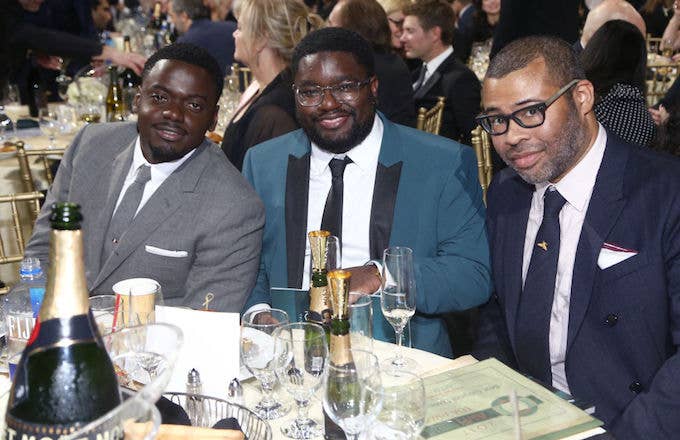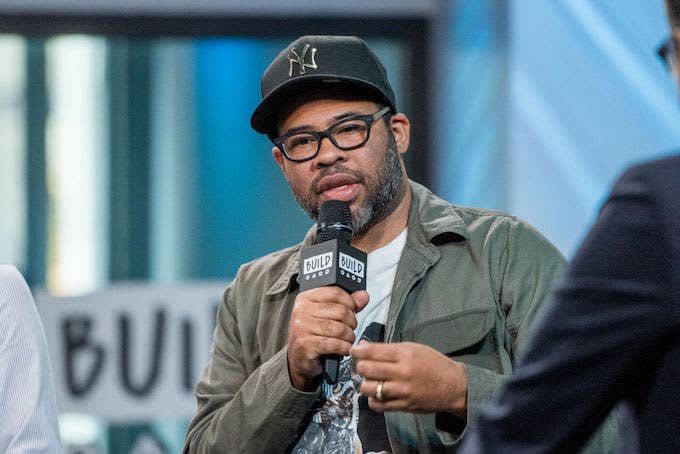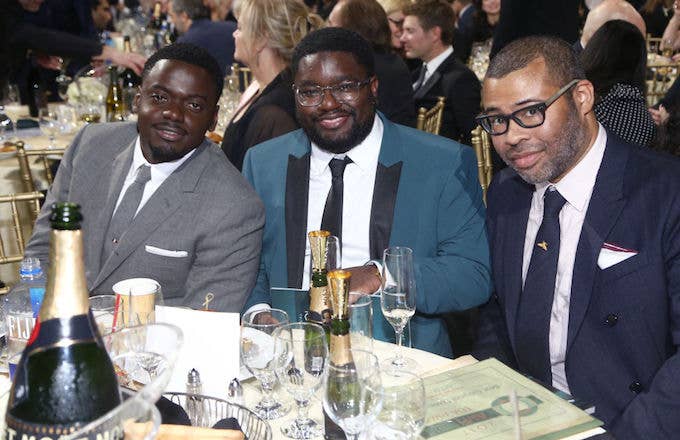
With the 90th Academy Awards just hours away, speculation about which movie will win big has reached frantic, surprise-Beyoncé-album-drop levels. But one of the Best Picture contenders has already won, no matter what’s inside the envelope at the end of Sunday night.
Jordan Peele’s horror masterpiece Get Out (which grabbed noms for Best Picture, Best Original Screenplay, Best Actor for star Daniel Kaluuya, and Best Director for Peele) was loved by critics, was a commercial smash, and killed it on the awards circuit. And, more important than that, it has changed the movie landscape in some very important ways.
Christina Raia is the Director of Crowdfunding at Seed&Spark, a streaming service and funding platform that focuses largely on independent film. She has noticed that Get Out’s financial success—the movie was last year’s most profitable, earning a whopping 630% return on investment—has had very direct results. “Bigger entities are interested in getting involved in the horror genre,” says Raia, noting that 3311 Productions and The Orchard recently approached her company to create a crowdfunding “rally” for horror films with a $25,000 prize.
A filmmaker herself, Raia found that her 2015 horror movie Summit was “very hit-or-miss” in terms of getting into film festivals that didn’t cater to horror specifically. But in the year since Peele released Get Out, she says, “festivals have been much more open to programming horror films. A lot of [the festivals] are itching for them, because they’re seeing that there’s an audience for it, and that they make money.”
And the fact that Peele’s movie was about race (the director has frequently referred to it as a “social thriller”) created a space, Raia continues, for festival directors to seek out what she calls “inclusive voices.” “They’re specifically trying to highlight voices that have previously been left out, and get these more socially relevant, contemporary lenses in their programming,” she says. “Which is awesome.”

If Get Out wins big at the Oscars, there is likely to be an increase in the money available to create future socially engaged horror films. “I’m hoping that will happen,” Raia says.
Horror journalist and digital archivist Ashlee Blackwell of Graveyard Shift Sisters, an encyclopedic website that focuses on “Black women and women of color in the horror and science fiction genres,” has also thought a lot about Get Out’s impact. To her, it’s crucial to acknowledge that the film is a horror movie, but more specifically a black horror movie.
“Black horror is about exploring the idea of what it means to be black in the world and what kind of fears are attached to being black,” she explains. “Specifically, it’s about fear of institutions keeping you from being your best self.
A lot of the festivals are itching for horror films now, because they’re seeing that there’s an audience for it, and that they make money.
“The other part of black horror,” she continues, “is the centrality of black characters and black lives and the demonstration of their fears. The most fascinating thing about black horror is a lot of it is based on these particular real-life fears that we have as black people that maybe other people don’t have, and implementing it into a fantastical narrative.”
For Blackwell, the fact that Get Out won so big at the box office means that the message that black horror can equal big bucks is getting through loud and clear. “The higher ups are recognizing there’s value in telling unapologetic stories about race that are in the horror genre,” she says.
That, of course, is no surprise to any horror fan, who Blackwell points out are “much more open-minded than people would like to imagine.” But she laments that despite increasing interest from both fans and execs, opportunities to make horror movies will likely not be distributed equally, with men more likely to get scripts approved before women.
Despite institutional sexism, Blackwell is convinced that black women will be behind the next big wave of great horror films. She mentions Mariama Diallo’s new Sundance-winning short Hair Wolf as an example.
“A lot of the women I’ve talked to as black directors are focused more on what is the black female experience,” she says. “These are the kind of perspectives and ideas that are going to really grab people’s attention.”
To Blackwell, what’s more important than Get Out’s success making Hollywood big shots loosen their purse strings or take more chances is the simple fact that Jordan Peele himself will have more power to get things done.
THE MOST FASCINATING THING ABOUT BLACK HORROR IS A LOT OF IT IS BASED ON THESE REAL-LIFE FEARS THAT WE HAVE AS BLACK PEOPLE.
“One of the first things [Peele] said after Get Out’s critical and commercial success was, I want to look at other black creators and see what else they’re doing,” Blackwell explains. “I think he wants to build his empire, get a mountain of money, and then he is really invested in talking to black creators. He’s kind of sneaking in the back door in a sense, because he is doing all these things for big production companies first. And then he was like, Let met get this person who is unknown in because they have this really good idea and I can help finance this. I can put my name behind it, I can be a producer.
“That's the biggest ripple effect that Get Out is going to have,” she concludes. “He’s going to get diverse voices really into the mainstream.”

